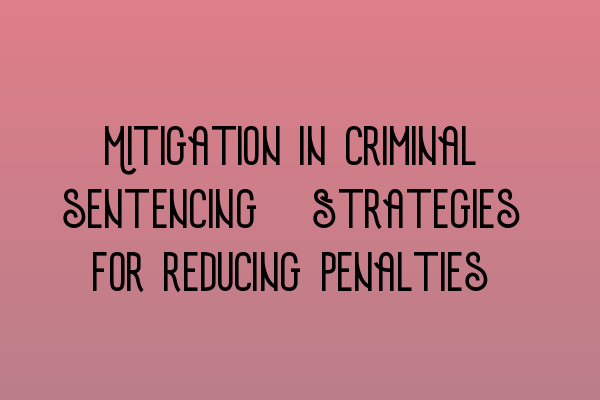Mitigation in Criminal Sentencing: Strategies for Reducing Penalties
Welcome to SQE Criminal Law & Practice UK! As expert solicitors in criminal law, we understand the importance of mitigation in criminal sentencing and how it can significantly reduce penalties. In this blog post, we will discuss effective strategies for mitigation and provide valuable insights on how to navigate the complex legal landscape.
Understanding Mitigation
Before diving into effective mitigation strategies, it is crucial to grasp the concept of mitigation in criminal sentencing. Mitigation refers to the presentation of evidence or arguments that aim to persuade the court to reduce the severity of the sentence imposed on a convicted defendant.
Mitigation can cover a wide range of factors, including the defendant’s personal circumstances, remorse, cooperation with the authorities, previous good character, and any other relevant factors that demonstrate a reduced degree of culpability.
For example, if an individual has been convicted of drug possession charges, their legal representation may present evidence of their sincere efforts towards rehabilitation, their lack of prior convictions, or any other relevant mitigating factors that might support a more lenient sentence.
Effective Strategies for Mitigation
1. Presenting a strong character reference: A character reference from a respected member of the community, such as an employer or community leader, can greatly influence the court’s perception of the defendant. Highlighting positive aspects of the defendant’s character and contributions may help soften the sentencing.
2. Demonstrating remorse and rehabilitation: Showing genuine remorse for the offense committed and taking proactive steps towards rehabilitation can be highly persuasive for the court. It is crucial for the defendant to demonstrate that they have learned from their actions and have taken concrete steps to change their behavior.
3. Engaging in community service or restorative justice: Participating in community service or restorative justice programs can demonstrate a commitment to making amends for the offense and positively contributing to society. This type of active involvement can be considered highly favorable by the court during sentencing.
4. Providing evidence of mitigating circumstances: If there were extenuating circumstances surrounding the offense, such as coercion or duress, it is essential to present compelling evidence to support the claim. Mitigating circumstances can significantly impact the court’s decision in terms of penalties imposed.
5. Collaborating with a skilled solicitor: Seeking the expertise of a solicitor who specializes in criminal law and has experience with mitigation can make a substantial difference in the outcome of a sentencing hearing. A knowledgeable solicitor will strategically present mitigating factors and arguments to maximize the chances of achieving a favorable reduction in penalties.
Conclusion
Mitigation is a vital aspect of criminal sentencing that can lead to substantial reductions in penalties. By utilizing effective strategies such as presenting character references, demonstrating remorse and rehabilitation, engaging in community service, providing evidence of mitigating circumstances, and collaborating with a skilled solicitor, defendants can greatly improve their chances of receiving a more lenient sentence.
If you require further assistance or professional guidance regarding mitigation or any other criminal law matters, please do not hesitate to contact SQE Criminal Law & Practice UK. Our team of expert solicitors is here to help you navigate the legal complexities and achieve the best possible outcomes for your case.
Related Articles:
- SQE 1 Practice Exam Questions
- SQE 1 Practice Mocks FLK1 FLK2
- SQE 2 Preparation Courses
- SQE 1 Preparation Courses
- SRA SQE Exam Dates
